Related Research Articles
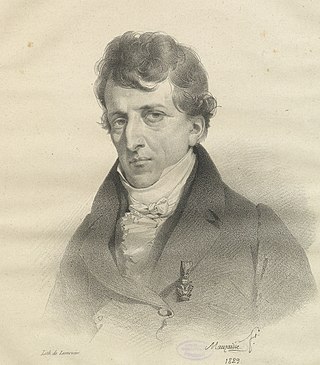
Giovanni Aldini was an Italian physician and physicist born in Bologna. He was a brother of the statesman Count Antonio Aldini (1756–1826). He graduated in physics at University of Bologna in 1782.
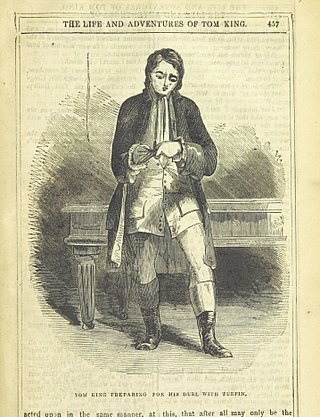
Tom King was an English highwayman who operated in the Essex and London areas. His real name is thought to have been Matthew King; whether "Tom" was a nickname or an error in reporting his crimes is uncertain, but it is the name by which he has become popularly known. Some sources claim that he was nicknamed "The Gentleman Highwayman" and he was also known as “Captain Tom King”. A contemporary account of his last robbery also mentions a brother, either John or Robert King, who was captured by the authorities on that occasion. Other reports also mention an “Elizabeth King”, possibly his wife who is mentioned in King's will.

A highwayman was a robber who stole from travellers. This type of thief usually travelled and robbed by horse as compared to a footpad who travelled and robbed on foot; mounted highwaymen were widely considered to be socially superior to footpads. Such criminals operated until the mid- or late 19th century. Highwaywomen, such as Katherine Ferrers, were said to also exist, often dressing as men, especially in fiction.

The Gambler is a 1974 American crime drama film written by James Toback and directed by Karel Reisz. It stars James Caan, Paul Sorvino, and Lauren Hutton. Caan's performance was widely lauded and was nominated for a Golden Globe.
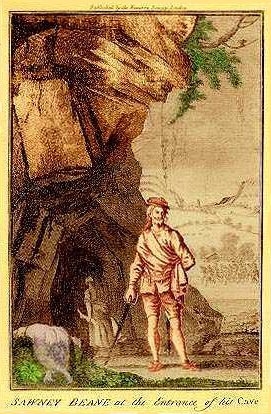
Alexander "Sawney" Bean is a legendary figure, said to have been the head of a 45-member clan in Scotland in the 16th century that murdered and cannibalised over 1,000 people in 25 years. According to the legend, Bean and his clan members were eventually caught by a search party sent by King James VI, and were executed for their heinous crimes.
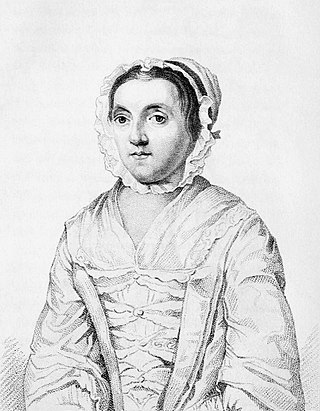
Elizabeth Canning (married name Treat; 17 September 1734 – June 1773) was an English maidservant who claimed to have been kidnapped and held against her will in a hayloft for almost a month. She ultimately became central to one of the most famous English criminal mysteries of the 18th century.
Pudd'nhead Wilson is a novel by American writer Mark Twain published on 28 November 1894. Its central intrigue revolves around two boys—one, born into slavery, with 1/32 black ancestry; the other, white, born to be the master of the house. The two boys, who look similar, are switched at infancy. Each grows into the other's social role.

The Spectator was a daily publication founded by Joseph Addison and Richard Steele in England, lasting from 1711 to 1712. Each "paper", or "number", was approximately 2,500 words long, and the original run consisted of 555 numbers, beginning on 1 March 1711. These were collected into seven volumes. The paper was revived without the involvement of Steele in 1714, appearing thrice weekly for six months, and these papers when collected formed the eighth volume. Eustace Budgell, a cousin of Addison's, and the poet John Hughes also contributed to the publication.
Alice Arden was an English murderer. She was the daughter of John Brigantine and Alice Squire, who conspired to have her husband, Thomas Arden of Faversham, murdered so she could carry on with a long-term affair with a tailor, Richard Moseby. The murder took place on 14 February 1551. She was tried, convicted, and burnt at the stake for her part in the murder.

Darren Osborne is a fictional character from the British Channel 4 soap opera Hollyoaks. He was introduced by executive producer Phil Redmond as part of the Osborne family, making his first screen appearance on 18 November 1996, portrayed by Adam Booth. Booth left the role in 1997, and the character was later recast to Ashley Taylor Dawson who first appeared in September 1999. Dawson left the role in 2000 to concentrate on his music career, though returned in 2003 and has remained in the role ever since. He remains one of the longest-running characters in the programme.

Colonel Francis Charteris, nicknamed "The Rape-Master General", was a Scottish soldier and adventurer who earned a substantial sum of money through gambling and the South Sea Bubble. He was convicted of raping a servant in 1730 and sentenced to death, but was subsequently pardoned, before dying of natural causes shortly afterwards.
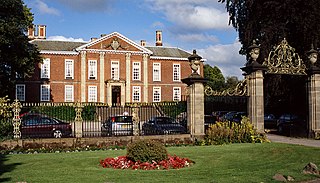
Bosworth Hall is a historic country house and Grade II* listed building in the rural town of Market Bosworth in Leicestershire, England, now known as the Bosworth Hall Hotel. It was the country seat of the Dixie family for nearly three hundred years. Since the 1980s the house has had several owners and is now a hotel.

Yellow Sky is a 1948 American Western film directed by William A. Wellman and starring Gregory Peck, Richard Widmark, and Anne Baxter. The story is believed to be loosely adapted from William Shakespeare's The Tempest. The screenplay concerns a band of reprobate outlaws who flee after a bank robbery and encounter an old man and his granddaughter in a ghost town.

James Hind was a 17th-century highwayman and Royalist rabble-rouser during the English Civil War. He came from the town of Chipping Norton, Oxfordshire. He fought in the English Civil War for the Royalist cause. Some reports tell of him assisting the escape of King Charles II after his defeat at the Battle of Worcester. After the war, he took up highway robbery against the Commonwealth forces with his exploits both real and embellished printed in numerous pamphlets that made him into a Royalist folk hero of the Robin Hood mould. His partner Thomas Allen was captured when they attempted but failed to rob Oliver Cromwell. Hind also robbed John Bradshaw, President of the High Court of Justice for the trial of King Charles I. He refused to rob Cavaliers and even gave money to poor Royalists.

Edward Morgan was a Welsh Roman Catholic priest and martyr. He was declared venerable by Pope Leo XIII in 1886.

Elizabeth Needham, also known as Mother Needham, was an English procuress and brothel-keeper of 18th-century London, who has been identified as the bawd greeting Moll Hackabout in the first plate of William Hogarth's series of satirical etchings, A Harlot's Progress. Although Needham was notorious in London at the time, little is recorded of her life, and no genuine portraits of her survive. Her house was the most exclusive in London and her customers came from the highest strata of fashionable society, but she eventually ran afoul of the moral reformers of the day and died as a result of the severe treatment she received after being sentenced to stand in the pillory.
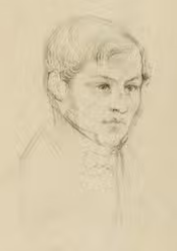
François Benjamin Courvoisier was a Swiss-born valet who was convicted of murdering his employer Lord William Russell in London, England, and hanged outside Newgate Prison on 6 July 1840. A crowd of around 40,000 witnessed his death, including Charles Dickens and William Makepeace Thackeray.

Patrick McGregor, better known as Gilderoy, was a Scottish outlaw and mass murderer who engaged in cattle raiding, blackmail and extortion in the regions of Strathspey, Braemar, Cromarty and other areas near Aberdeen during the Stuart period. After being caught by the Scottish authorities, he was executed in Edinburgh in 1636. McGregor has become a figure in Scottish folklore, including ballads, songs and idioms. His nickname has been alternatively rendered as Gilroy, Gilder Roy and Gilleroy.
References
- 1 2 Brewer's Concise Dictionary of Phrase and Fable. London: Helicon Publishing. 1992. ISBN 1-85986-286-1.
- 1 2 3 "No. 2". The Spectator. 1711-03-02. Archived from the original on 7 September 2006. Retrieved 22 November 2006.
- ↑ "The Newgate Calendar: Davy Morgan". 1842. Retrieved 22 November 2006.